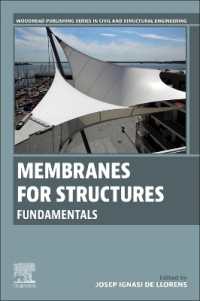- ホーム
- > 洋書
- > 英文書
- > Politics / International Relations
Full Description
Much of our understanding of the world is framed from the perspective of a dominant power center, or from standard readings of historical events. The architecture of international information distribution, academic centers, and the lingua franca of international scholarly discourse also shape these stories. Remoteness Reconsidered employs the idea of remoteness as an analytical tool for viewing international law's encounter with the Americas from the unusual, peripheral perspective of the Atacama Desert. The Atacama is one of the most remote places on Earth, although that less-than-accurate perspective comes from standard historical accounts of the region, accounts that originate from the "center." Changing the usual frame of reference leads to a reconsideration of the idea of remoteness and of the subsequent marginalization of historical narratives that influence hemispheric international relations in important ways today. Lessons about international law's encounters with neoliberalism, indigenous and human rights, and the management and extraction of mineral resources take on new significance by following a spatial turn toward the idea of remoteness as applied to the Atacama Desert.
Contents
Acknowledgments
Introduction
The Path of this Book
Remoteness Generally Reconsidered
Elements of Remoteness
Temporal Remoteness and the Problem of Periodization
International Law's Struggle with Remoteness and Periodization
Two Current Problems: Globalization and the Anthropocene
Geographic Remoteness
Territorializing Remoteness
Lines and Maps
Doctrinal Remoteness Demarginalizing the Desert Conclusion
Nomos
Carl Schmitt and Nomos
The Dynamics of Biogeography
Spanish Incursions into the Atacama
Guano and Nitrates
The War of the Pacific
Water
The Source of the Riparian Dispute
A Deep History of Tension
Psychological Effects of the War of the Pacific and Goffmanian Metaphor
The Importance of Metaphors and International Law
Dramaturgy
Ceremonial Profanations and Legal Vandalism
The Evolution of Transboundary Fresh Water Law
Evolution of the International Law Defining Watercourse
The Watercourse Convention
A Clash of Interests: Sovereignty versus Watercourse Integrity
The Doctrine of International Servitude
The Absolute View: The Harmon Doctrine
The Restrictive Theory of Prior Rights
Rise of Equitable Use and Mutual Accord: A Community of Interests?
Conclusion
Lithium
Competing Perspectives
Chile's Economic Transition and 'Lost Decade'
The Chicago Boys
Bolivia and Dependency Theory: The Antipode
Bolivia's Alternative View of Extractivism
Lingering Effects of Bolivia's Postcolonial Encounter
Bolivia's Fitful Relation to Neoliberalism
Argentina and Neoliberalism
Conclusion
The Spatial Turn, Extractivism, and Remoteness
Bibliography
Name Index








